Abstract
Starch accumulation rate in leaves of vegetative soybeans is inversely related to the length of the daily photosynthetic period. However, it is not known whether a similar response would be observed during reproductive growth. Soybeans (Glycine max L. Merr. cv Amsoy 71) were grown to three stages of reproductive growth (beginning seed, mid seed-fill, and late seed-fill) under 12-hour daylengths, and then shifted to 6-hour photosynthetic periods (12-hour photoperiods) for 4 days. One and 4 days after treatment, a mid-canopy leaf was pulsed with 14CO2, and sampled for radiolabeled starch and water-soluble compounds at 0.5, 1, 3, 9, and 21 hours after labeling.
Plants exposed to the 6-hour photosynthetic periods at the beginning seed stage retained and incorporated significantly more label as starch than did those given 12-hour photosynthetic periods. However, plants exposed to the shortened photosynthetic periods at the late seed-fill stage partitioned less label into starch. Plants exposed at mid seed-fill gave a variable response.
Shortened photosynthetic periods resulted in preferential partitioning of recently fixed carbon to the seed at the expense of the pod wall. The results of these experiments suggest that the increased sink demand present during late reproductive growth may be of greater importance in control of leaf starch accumulation than is the length of the daily photosynthetic period.
Full text
PDF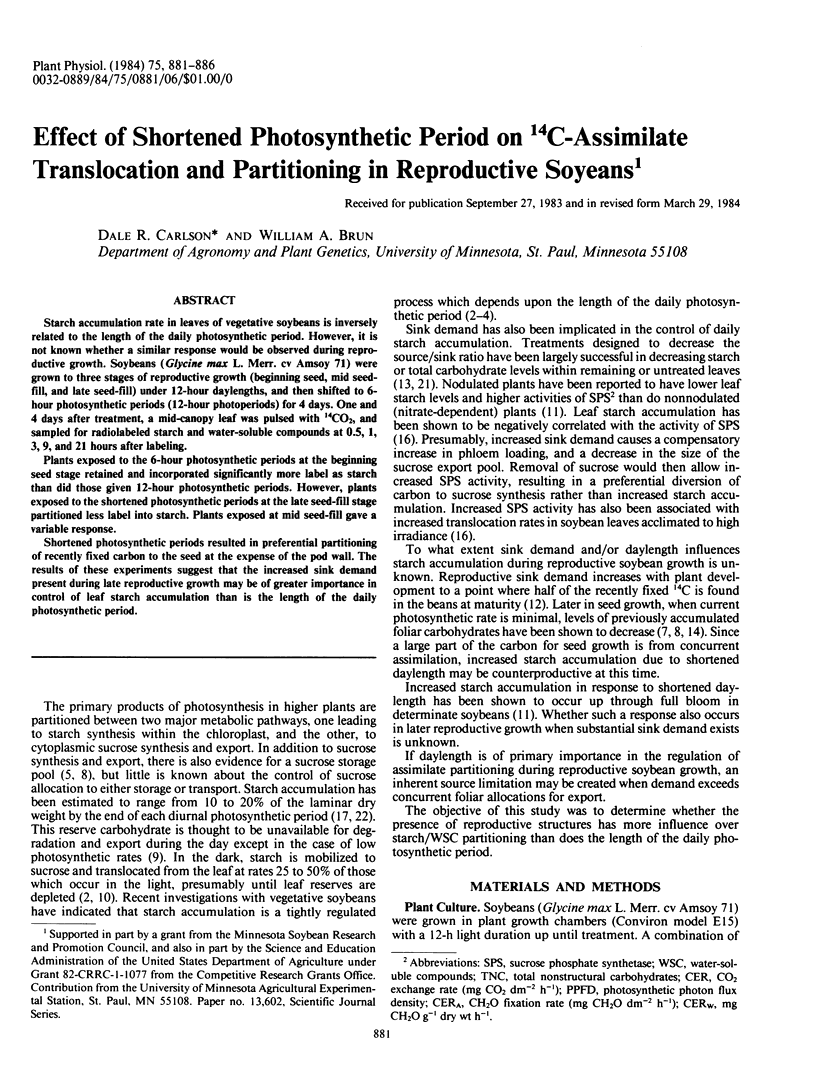
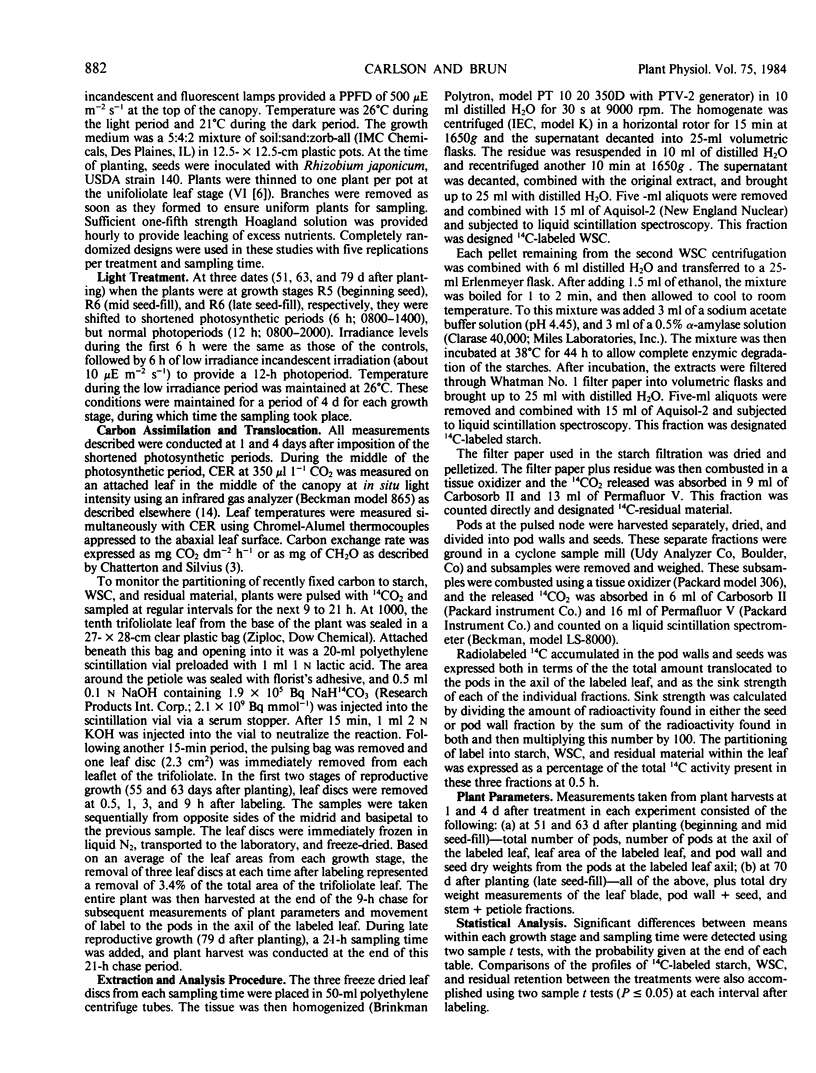
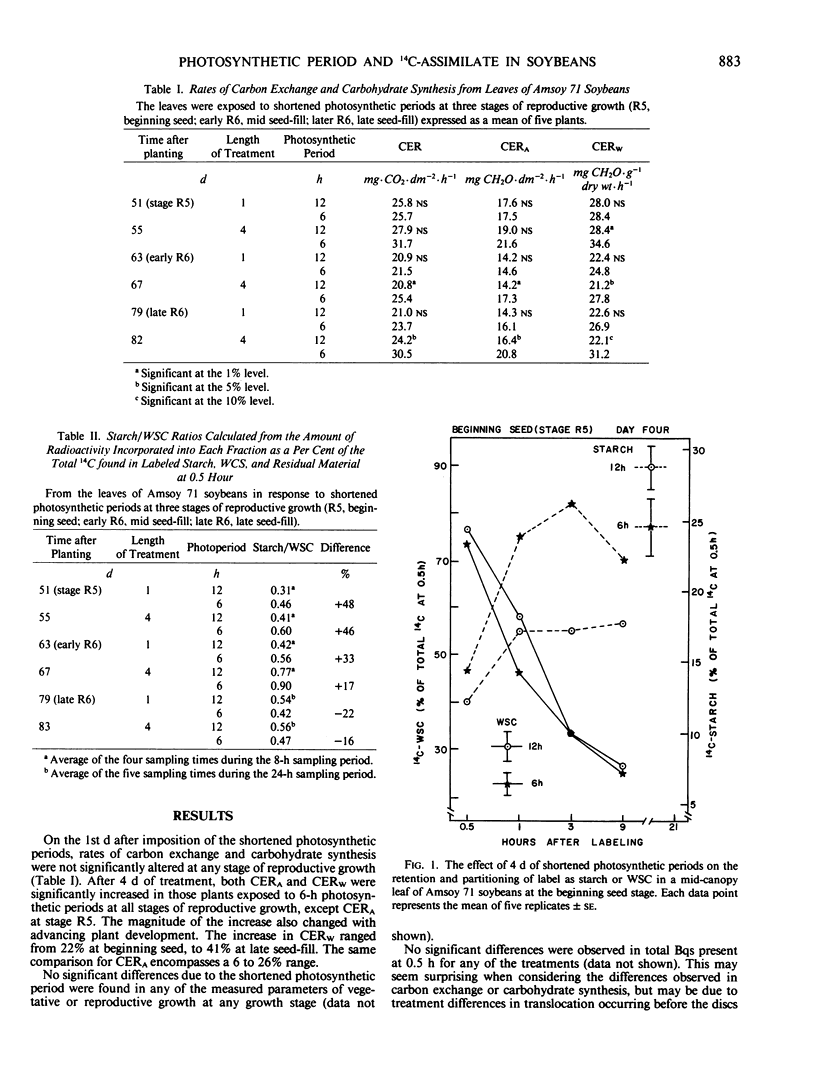
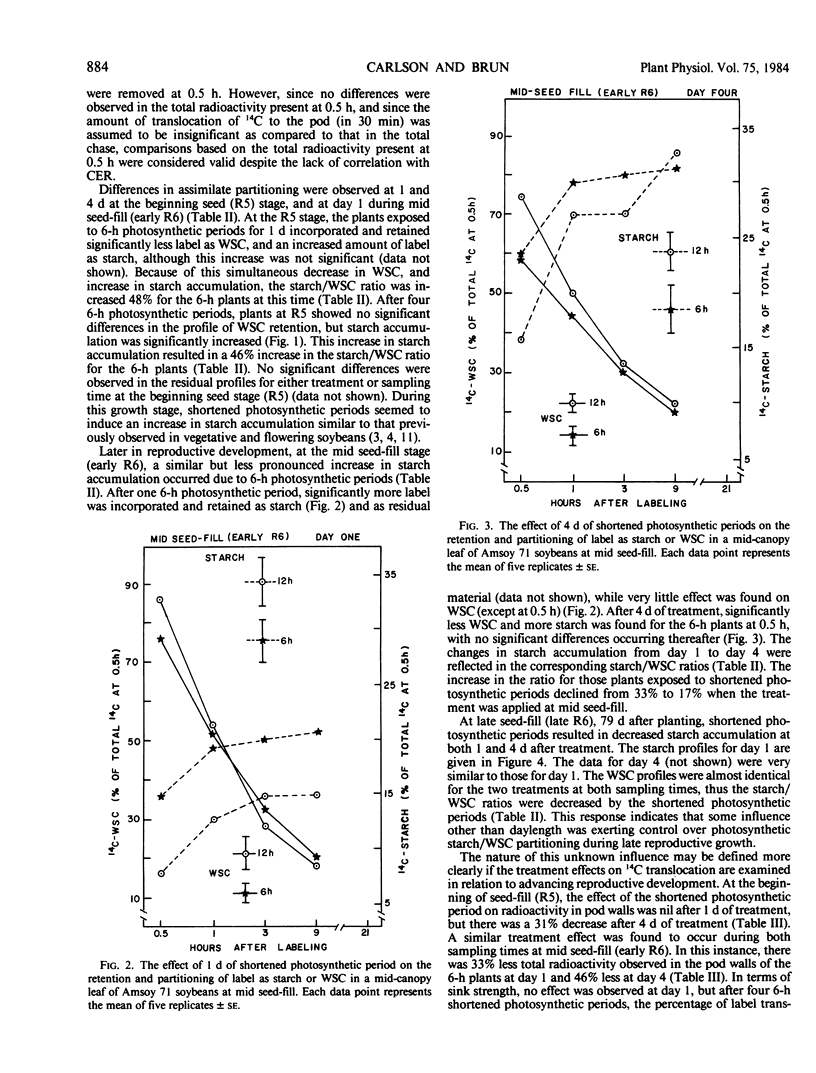
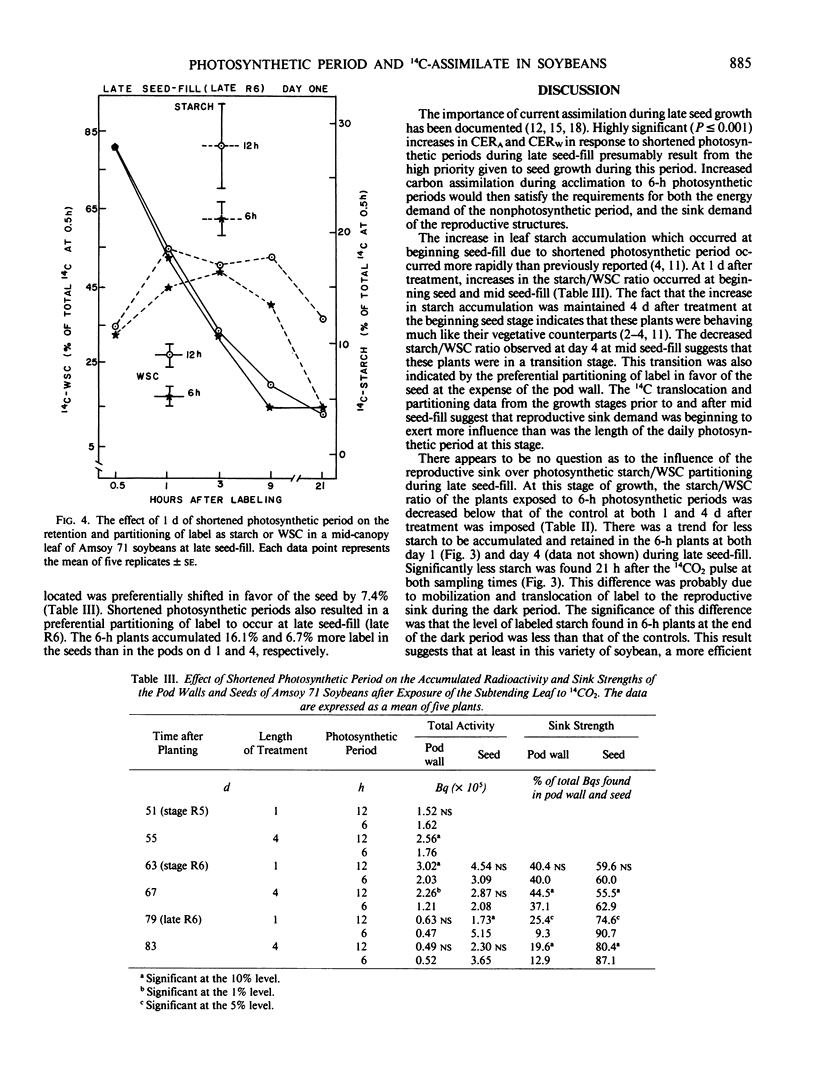
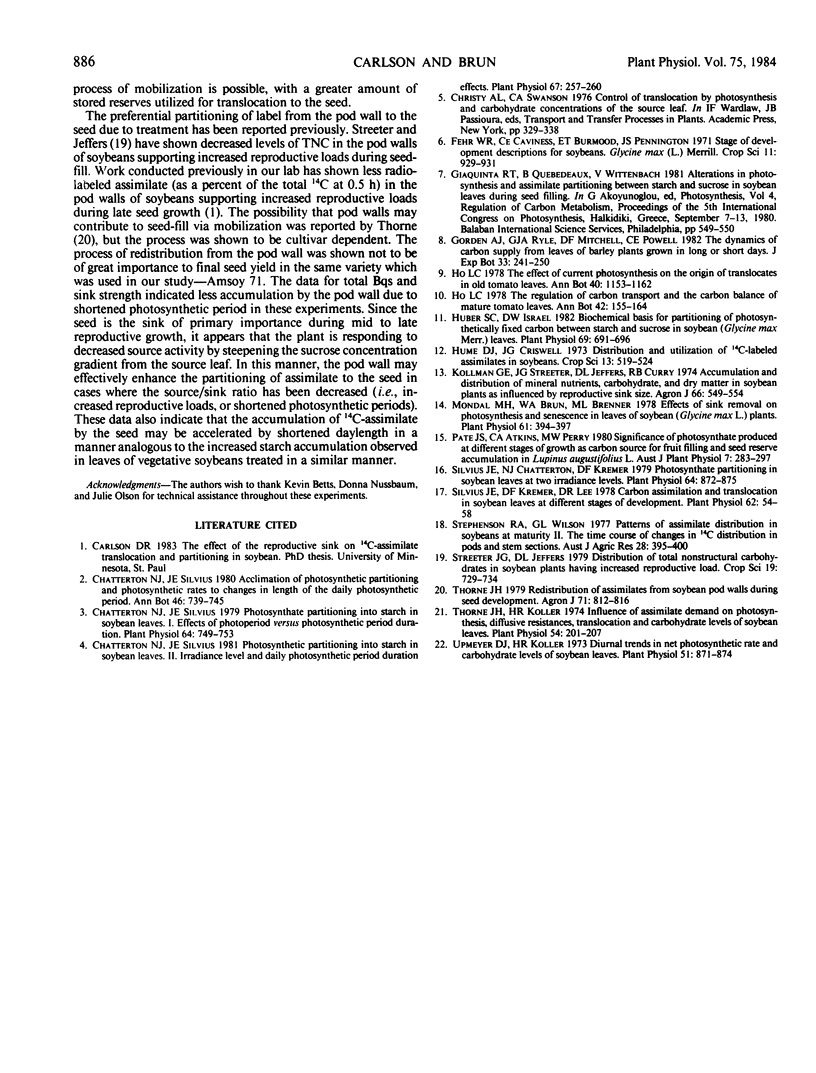
Selected References
These references are in PubMed. This may not be the complete list of references from this article.
- Chatterton N. J., Silvius J. E. Photosynthate Partitioning into Starch in Soybean Leaves: I. Effects of Photoperiod versus Photosynthetic Period Duration. Plant Physiol. 1979 Nov;64(5):749–753. doi: 10.1104/pp.64.5.749. [DOI] [PMC free article] [PubMed] [Google Scholar]
- Chatterton N. J., Silvius J. E. Photosynthate Partitioning into Starch in Soybean Leaves: II. IRRADIANCE LEVEL AND DAILY PHOTOSYNTHETIC PERIOD DURATION EFFECTS. Plant Physiol. 1981 Feb;67(2):257–260. doi: 10.1104/pp.67.2.257. [DOI] [PMC free article] [PubMed] [Google Scholar]
- Huber S. C., Israel D. W. Biochemical Basis for Partitioning of Photosynthetically Fixed Carbon between Starch and Sucrose in Soybean (Glycine max Merr.) Leaves. Plant Physiol. 1982 Mar;69(3):691–696. doi: 10.1104/pp.69.3.691. [DOI] [PMC free article] [PubMed] [Google Scholar]
- Mondal M. H., Brun W. A., Brenner M. L. Effects of Sink Removal on Photosynthesis and Senescence in Leaves of Soybean (Glycine max L.) Plants. Plant Physiol. 1978 Mar;61(3):394–397. doi: 10.1104/pp.61.3.394. [DOI] [PMC free article] [PubMed] [Google Scholar]
- Silvius J. E., Chatterton N. J., Kremer D. F. Photosynthate partitioning in soybean leaves at two irradiance levels: comparative responses of acclimated and unacclimated leaves. Plant Physiol. 1979 Nov;64(5):872–875. doi: 10.1104/pp.64.5.872. [DOI] [PMC free article] [PubMed] [Google Scholar]
- Silvius J. E., Kremer D. F., Lee D. R. Carbon assimilation and translocation in soybean leaves at different stages of development. Plant Physiol. 1978 Jul;62(1):54–58. doi: 10.1104/pp.62.1.54. [DOI] [PMC free article] [PubMed] [Google Scholar]
- Thorne J. H., Koller H. R. Influence of assimilate demand on photosynthesis, diffusive resistances, translocation, and carbohydrate levels of soybean leaves. Plant Physiol. 1974 Aug;54(2):201–207. doi: 10.1104/pp.54.2.201. [DOI] [PMC free article] [PubMed] [Google Scholar]
- Upmeyer D. J., Koller H. R. Diurnal trends in net photosynthetic rate and carbohydrate levels of soybean leaves. Plant Physiol. 1973 May;51(5):871–874. doi: 10.1104/pp.51.5.871. [DOI] [PMC free article] [PubMed] [Google Scholar]


